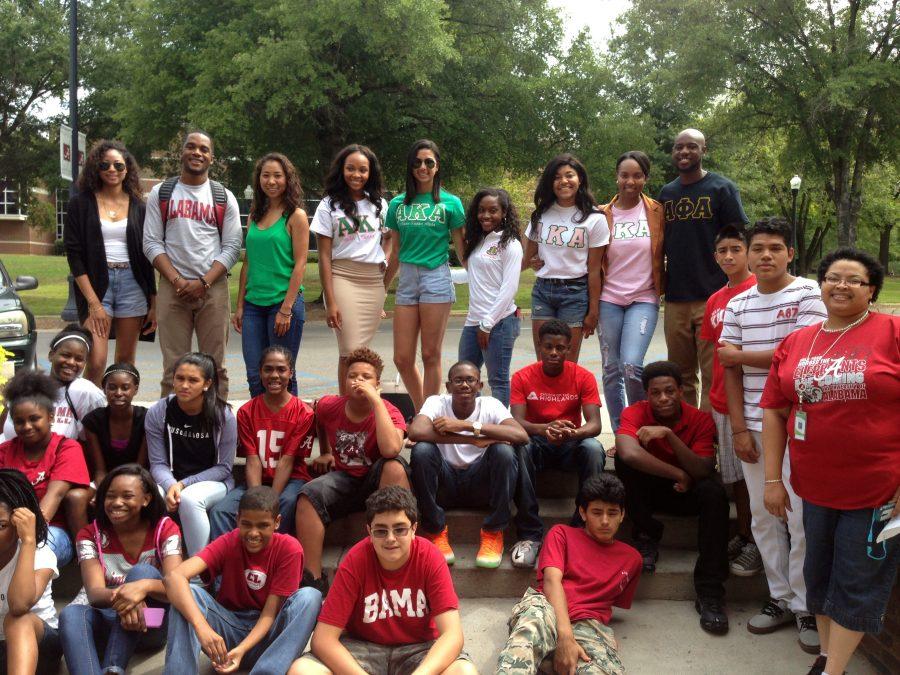That man, Carl A. Elliott, went on to become a congressman in the House of Representatives and fight for education throughout his career. The Elliott Society at the University was founded to carry on Elliott’s mission of educational equity today.
“Carl Elliott provided a beacon of hope, and that is the work that the Elliot Society is trying to carry on today,” said Stephen Katsinas, the faculty advisor to the Elliott Society.
The society is a service honors society that focuses on honoring students who have contributed to the community as well as providing students with opportunities to become more involved. Its main service initiative is Kick Start College, a program that invites students from low-income middle schools to tour the University’s campus. The Kick Start graduation ceremony is intended to solidify the fact that getting a diploma is available for everyone.
Undre Phillips, a senior majoring in secondary education, launched Kick Start College three years ago, which serves Title I middle schools, where the children receive free or reduced lunches. Many of them go to high school underprepared for the college admissions process.
“The Kick Start College program is unique because it is not just a field trip to campus; it is an engagement experience that informs and gives insight to the college application process,” Phillips said. “This program is made to reach out to the downtrodden that don’t know about education, that don’t have the knowledge and access to higher educations.”
Before Kick Start College, many of the students had never even heard of a grade point average.
In August, the Urban Institute came out with a report that stated middle school was the ideal time to reach-income students to inform them of all the financial aid opportunities available. The program starts with the Capstone Men and Women giving a tour of the University’s campus, a visit to a lecture hall, a presentation on college admissions, and a free meal at Lakeside Dining. It concludes with a graduation ceremony representing the endless possibilities the program promotes. During the program, the children receive a packet with step-by-step instructions describing how to get into college and access financial aid as well as a poster they can hang on their wall.
“You can’t achieve an education if you don’t know about it and you haven’t seen it, at the very least,” said Michael Malley, a graduate student starting his doctorate in educational research. “Kick Start College is an inspiring program that gives the kids the feeling that an education at UA is accomplishable. It’s amazing how many kids in Tuscaloosa live just five miles away but have never been to the campus.”
The Elliott Society recently received important financial support from Peter Hlebowitsh, dean of the College of Education, which will allow the program to start tracking the impact of Kick Start College on college attendance rates.
“It’s about solving the issue of poverty in Alabama, period,” Phillips said. “Wherever there is poverty in this state, The University of Alabama should be there, utilizing the abundance of resources that we have.”
The program continues to expand and improve every year. Since its inception, Kick Start has grown from 150 students to over 1,200 students from Title I middle schools. The Elliott Society hopes to expand the program to include more middle schools and ultimately send the message that a higher education is possible for every student, no matter what their background is.
“My philosophy is to make education equitable, even if 15-20 students go to college that wouldn’t have otherwise gone to college,” Phillips said. “We can’t get them all, but making an opportunity for them is what this program is all about. That’s why we do what we do.”
The Elliott Society accepts applications through MySource and seeks students who are involved around the campus and the community. In addition to Kick Start College, they bring in state legislators and other important figures around Alabama to speak to and network with members.
“There was, and still is, no doubt in my mind that education represents nothing less than a doorway to personal fulfillment, social justice, true freedom and actual equality among all Americans,” said the late Carl Elliott.









